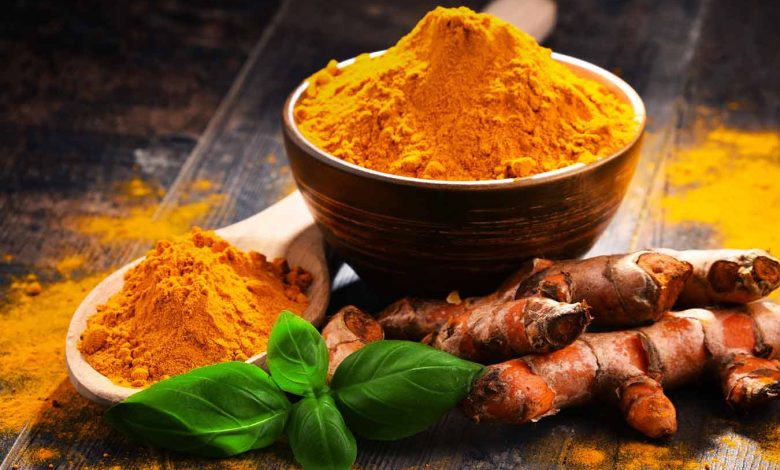8 Health benefits of turmeric and Curcumin

If you’re wondering what the benefits of turmeric and curcumin are, keep reading. We’ll go over its anti-inflammatory and antioxidant properties, how it supports the function of the spleen, and how it can help reduce blood sugar. But the list goes on. So, how do you enjoy their health benefits? Read on to learn more!
Anti-inflammatory properties
Researchers have confirmed that turmeric and curcumin exhibit anti-inflammatory effects. Studies have shown that both compounds inhibit the production of inflammatory cytokines, TNF-a and IL-1b. Curcumin also inhibits the secretion of matrix metalloproteins, which are responsible for the breakdown of synovial tissues. It has also been shown to inhibit their secretion from human articular chondrocytes. It has been shown to reduce neuroinflammation in mice models of traumatic brain injury and also reduces the activation of macrophages and microglial cells and enhances neuronal survival.
Curcumin also appears to inhibit the production of tau protein, a protein implicated in Alzheimer’s disease. While research on this effect is mixed, a small clinical trial found that turmeric did not improve cognitive function or slow cognitive decline in Alzheimer’s patients who took turmeric supplements for six months. Osteoarthritis is a condition characterized by inflammation and pain. While non-steroidal anti-inflammatory drugs (NSAIDs) are the most common treatment for osteoarthritis, turmeric and curcumin may help reduce pain by inhibiting the production of pro-inflammatory markers in the body.
Antioxidant properties
Researchers have found that turmeric may help protect the brain against inflammatory diseases and degenerative diseases. This spice is thought to increase levels of brain-derived neurotrophic factor (BDNF), a protein that regulates the communication between nerve cells. BDNF is essential for memory and learning, and lower levels of the substance are linked to various brain disorders, including Alzheimer’s disease, Parkinson’s disease, and vascular dementia. However, more research is needed to determine whether turmeric has any beneficial effects on brain health.
Curcumin is a yellow pigment found in turmeric that has several beneficial effects. The compound is used in food as a food-coloring agent and is also used in medical preparations for its antioxidant and anti-inflammatory properties. Chronic pathological conditions are associated with the free-radical peroxidation of lipids in cell membranes, as well as oxidative damage to DNA and proteins. Curcumin is believe to play a role in protecting against these diseases.
Supports spleen function
Turmeric is an important spice that has many health benefits. It is available in capsules, tinctures, and fluid extracts. Turmeric powder is best consume by drinking turmeric milk or eating turmeric paste. Turmeric supplements can cause adverse reactions and should not be use by people with diabetes, lactation, or any type of blood-thinning medication. This wonder spice also has many other health benefits, including the ability to improve the function of the spleen.
The inflammatory response to curcumin-treated mice improved. Vidalista 60 Mg is the best way to improve personal health problems in men. Researchers found that curcumin boosted the number of immune cells in the spleen, including those responsible for producing antibodies. Turmeric and ginger therapy also improved the immune status of immunocompromised mice. The compound curcumin has a significant anti-inflammatory effect on spleen white blood cells, and it reduces the adverse effects associated with carbon tetrachloride intoxication.
In mice, a study using a Leishmania parasite found that curcumin reduced the production of IFNg (interferon-gamma). The inflammatory response to leishmania infection is associate with a higher expression of PPARg and IFNg than in uninfecte mice. In vitro studies on mice fed curcumin showed that the inflammatory response was reduce by ninety percent compare to controls.
Lowers blood sugar
The use of turmeric and curcumin supplements is now recognize as an effective way to combat diabetes. The antioxidants in these natural foods can improve insulin resistance, which is the root cause of high blood sugar. In addition, curcumin has been show to reduce the inflammatory factors that contribute to diabetes and improve glycemic control. Combined, these benefits can help reduce the risk of diabetes and prediabetes. Diabetes affects approximately 34 million Americans and costs an estimated $327 billion per year.
The anti-inflammatory effects of curcumin and turmeric have been demonstrat in clinical trials, and researchers have find promising results. In one such study, researchers found that turmeric supplementation significantly reduced blood glucose and improved insulin sensitivity in mice and rats. In addition, the supplementation improved beta-cell function in diabetic mice. Although further research is need to confirm this, it seems that curcumin and turmeric are safe and effective natural diabetes treatments.
Improves insulin sensitivity
Taking a daily supplement of magnesium, a mineral that plays an important role in hundreds of physiological processes may improve insulin sensitivity. Magnesium is also find in dark chocolate, halibut, leafy greens, and berries. However, it is also possible to take an oral magnesium supplement. Taking magnesium supplements can have many benefits, from improving insulin sensitivity to lowering the risk of developing type 2 diabetes.
Zinc and copper are two of the most important minerals for insulin sensitivity. Studies have shown that the ruminant liver is a good source of zinc, which is necessary for insulin signaling to lean tissue cells. Zinc and copper are also find in oysters and are associate with improve insulin sensitivity. Other sources of copper are describe in the literature. There are still many more ways to improve insulin sensitivity. Here are a few.
Increasing muscle mass is a great way to increase insulin sensitivity. Muscle consumes 70 to 90 percent of blood glucose, and exercise increases this demand. This increases insulin sensitivity in cells and persists for 24 hours after a workout. A 10-percent increase in muscle mass reduces insulin resistance by 11 percent. For people with type 2 diabetes, this effect can be even more dramatic. But don’t stop exercising just yet. You’ll need to change your diet to incorporate exercise.
Reduces inflammation
The bioactive substance curcumin inhibits the production of several molecules that are associate with the inflammatory response. Specifically, it inhibits the production of cyclooxygenase, inducible nitric oxide synthase (COX-2), and adhesion molecules. However, curcumin does not reduce the production of interferon-gamma, epidermal growth factor, or MCP-1. These findings suggest that curcumin may exert immunomodulatory effects.
Curcumin has been show to reduce oxidative stress. It does this through the Nrf2/ARE pathway. Numerous studies have reviewed this pathway. Researchers have also found that curcumin reduces inflammatory biomarkers. In addition to reducing inflammation, it also promotes cellular health, thereby preventing cardiovascular disease. In fact, curcumin is a powerful antioxidant, which helps the body fight against a host of diseases and inflammatory conditions.
Although Turmeric is generally safe for use in humans at low doses, it should be take with caution. It may interact with other medications, including anti-inflammatory drugs. Therefore, consult with your healthcare provider before taking turmeric. Also, you should avoid consuming turmeric in high doses. Further studies are need to determine the best dosage for turmeric. There are several precautions to follow when consuming turmeric. If you are pregnant, breastfeeding, or have any medical condition, consult your doctor before using turmeric.
Reduces oxidative stress
Several antioxidants have shown neuroprotective effects and are use as treatment options for oxidative stress. Some of these agents are iron chelators, but these have side effects and may not be suitable for all patients. The polyphenols in green tea, particularly (-)-epigallocatechin-3-gallate, can also act as antioxidants by scavenging free radicals and chelating excess metal ions. They also inhibit redox-sensitive transcription factors and induce phase II antioxidant enzymes.
One study examined the effects of ascorbate treatment on apheresis-induced oxidative stress in healthy subjects. The study was conducte at the National Taiwan University College of Medicine, the Department of Health, the Formosan Blood Purification Foundation, and the Chung-Yuan Christian University. The researchers found that ascorbate treatment significantly reduced levels of these oxidative markers, which suggests a protective effect against apheresis.
The results of this study showed that pretreatment oxidative damage to lipids was significantly lower in birds with no clinical signs of illness. Birds that were supplemente had lower levels of reduce glutathione compare to those that were unsupplemente. However, pretreatment oxidative damage to lipids was not altere in supplemente birds. For this study, it’s important to note that resveratrol supplementation does not necessarily prevent viral infections. Buy Vidalista 20 Mg Is for men’s impotence problem.
Protects against cancer
Research indicates that curcumin and turmeric may have anti-cancer properties. They inhibit RANKL, a protein molecule found in breast cancer cells, and down-regulate the expression of genes that promote tumor formation and migration. Curcumin inhibits the activation of STAT3 and Akt signaling pathways and has anti-proliferative effects on tumor cells. It inhibits the growth of breast cancer cells and reduces pain associated with radiation therapy.
Curcumin affects several different molecules involved in cancer, including transcription factors and growth factors. These proteins play critical roles in DNA replication and cell signaling. Turmeric also influences apoptotic proteins that help control cell death. In a phase, I clinical trial, turmeric inhibited tumor growth in mice and rats. In other studies, it prevented the spread of cancer cells in the intestine. The researchers are still studying its effects on tumors.
Studies on curcumin-containing products have found that the compound inhibits bacterial growth and adherence. The substance also inhibits the pro-inflammatory activities of upper respiratory epithelial cells. These results suggest that turmeric and curcumin may have a cancer-fighting effect. The potential benefits of turmeric for cancer prevention are so great that the spice is already a household name in Indian cooking. While its origin is largely unknown, it has been use for thousands of years in Asian cultures to treat a variety of different diseases.



